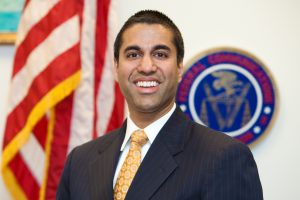Ajit Pai Talks Spectrum and FCC Reform on High Tech Forum
[powerpress]
 In this edition of the High Tech Forum Podcast, Richard Bennett is joined by Federal Communications Commission (FCC) Commissioner Ajit Pai (@AjitPaiFCC) to discuss a range of issues, including the agency’s set-top box and broadband privacy proposals, and a big item Pai would like on the 2017 FCC agenda. This podcast was recorded last week ahead of the lifting of the “sunshine” prohibition on the FCC’s set-top box item and ahead of the release of Chairman Wheeler’s broadband privacy fact sheet.
In this edition of the High Tech Forum Podcast, Richard Bennett is joined by Federal Communications Commission (FCC) Commissioner Ajit Pai (@AjitPaiFCC) to discuss a range of issues, including the agency’s set-top box and broadband privacy proposals, and a big item Pai would like on the 2017 FCC agenda. This podcast was recorded last week ahead of the lifting of the “sunshine” prohibition on the FCC’s set-top box item and ahead of the release of Chairman Wheeler’s broadband privacy fact sheet.
Below are a few highlights, but make sure to check out the full podcast for the entire discussion.
SET-TOP BOX
Pai on STB: “The devil is going to be in the details and right now the details are still secret.”
Commissioner Pai reiterated his views on the current set-top box proposal, when the item was still under the “sunshine” prohibition last week. First, he says FCC Chairman Tom Wheeler should make the proposal public. Second, he says that Wheeler should embrace where the marketplace is going vs. where it was 20 years ago.
PRIVACY NPRM
Pai on Privacy: “I hope this next proposal reflects more of a carefully calibrated view of how the internet actually operates and is used.”
In the discussion, which was recorded last week, Bennett and Pai discuss the rumored move by the FCC to closely align its approach to regulating privacy with that of the Federal Trade Commission (FTC).
Pai tells Bennett that if the rumors about the movement of the FCC plan towards the FTC model were in fact true that it “would be terrific.” Pai speculated that one reason why the FCC might move toward this direction could be political pressure, given that the FTC has said that the Chairman’s proposal would not protect consumers. Pai also noted that another motive might be technical; edge providers are the dominant players in online advertising, not ISPs, and ISPs don’t have unique insight into the behavior of broadband consumers given the heavy use of encryption by web sites.
Bennett notes that some of the data that ISPs handle is sensitive, but they can’t see most of it because of encryption. When data is visible to ISPs, they use algorithms to separate sensitive data from ordinary information.
Pai continues by stating that upwards of 75-80 percent of all internet traffic is now encrypted and ISPs typically do not know information beyond the web domains consumers visit. For example, they are not able to tell what information the consumer is accessing while visiting a specific domain.
Pai and Bennett discuss the fact that consumers are confused by inconsistent regulation, but they just want their sensitive data protected regardless of who has access to it.
THUNE’S SPECTRUM BILL
Pai on MOBILE NOW legislation: “[This is] an opportunity to show national leadership in the area of spectrum…if another country is more forward thinking, investment and innovation will flow elsewhere.”
Pai hopes that Sen. Thune’s “MOBILE NOW” bill moves forward because it’s a good bipartisan solution that would make substantial progress on spectrum policy. Bennett notes that U.S. leadership in 5G becomes questionable at some point without the bill’s passage.
HOUSE PASSAGE OF COMMUNICATIONS ACT UPDATE
Pai on the Communications Act Update: “This [passage] is a remarkable feat in this polarized environment. And is another bill that I hope the Senate will take seriously over the next couple months.”
Bennett was particularly interested in the FCC process reform bill in the package of eight bills, which allows a majority of commissioners to put items on the FCC’s agenda. Currently, only the Chairman may propose regulations, which gives him too much power. Bennett believes that changing this would go a long way to establish a non-partisan atmosphere in the agency.
Pai states, “I don’t think if the average person knew exactly how this place operated they would find it rational in the least… we should be at least as open and transparent as Congress.”
The fact that members could pass the bipartisan Communications Act Update shows that Congress can find common ground on telecom even in a heated election season.
2017 FCC AGENDA
Pai on broadband deployment – his 2017 agenda item: “I think this is an area where we can work together in ways we haven’t in the last couple years.”
Pai tells Bennett his plan would remove some regulatory barriers to installing fiber, would streamline wireless rules and would enable future spectrum policy to be forward thinking to enable a 5G future.



